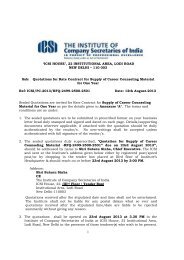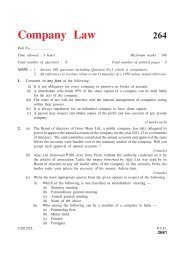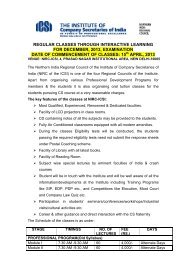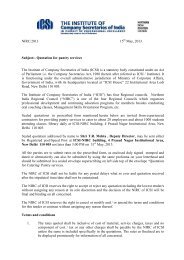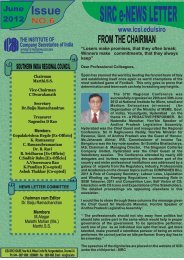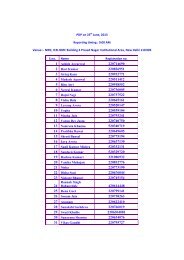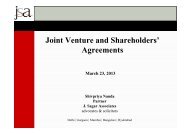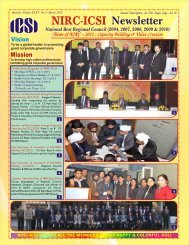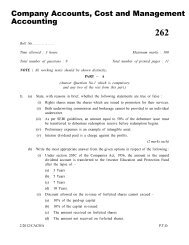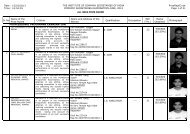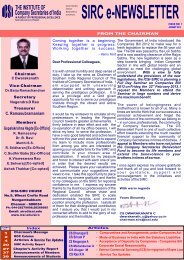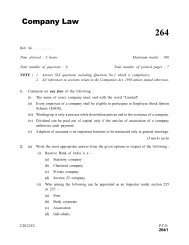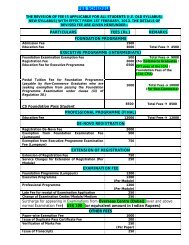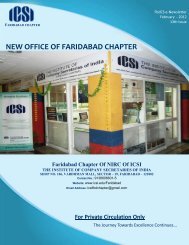NIRC News July 2011.pmd - Icsi
NIRC News July 2011.pmd - Icsi
NIRC News July 2011.pmd - Icsi
Create successful ePaper yourself
Turn your PDF publications into a flip-book with our unique Google optimized e-Paper software.
Article<br />
• Effective communication for better results<br />
Q: What are the additional responsibilities of Merchant<br />
bankers in SME Exchange?<br />
A: The Merchant Bankers in the main board assist the<br />
company in raising equity capital through primary record,<br />
but in the SME Platform the Merchant Bankers’ have to<br />
hand hold the company for 3 years and ensure that there<br />
is continuity in market making.<br />
The other additional responsibility is that the issue should<br />
be 100% underwritten and the merchant banker has to<br />
compulsory underwrite 15% in his own book of accounts.<br />
There is need for syndication for the purpose of under<br />
writing and the responsibility lies with the merchant<br />
banker. There is no such responsibility for the merchant<br />
banker on the main board.<br />
Q: Who can be the Members of the SME Exchange?.<br />
A: All the members of the equity (cash) segment of the<br />
BSE main board are by default the members of the BSE<br />
SME Exchange also.<br />
Q: Who can be the market makers in the SME Platform?<br />
A: Only the Members of the stock exchanges recognized<br />
by the SEBI can act as a market maker. The members<br />
desirous of becoming market maker have to get<br />
themselves registered as market maker with the<br />
exchange by filing the registration form. These members<br />
should have a minimum experience of 3 years, minimum<br />
net worth of Rs. 5 crores and a daily turn over of Rs. 10<br />
crores. The market maker shall have additional net worth<br />
of Rs. 2 crores for additional scrip.<br />
Q: How does the Market Making work?<br />
A: Market Making is an activity where the Member Brokers<br />
registered as market makers will undertake to support<br />
the scrip by providing two way quotes. All the market<br />
makers in a scrip will provide 2-way quotes for 75% of<br />
the time in a trading day. The market makers will have<br />
to hold 5% of the specified security to be listed at the<br />
time of allotment in their inventory to do the market<br />
making. In addition to this, the market makers can also<br />
buy from or sell to the nominated investors the required<br />
shares for market making. The merchant banker and<br />
nominated investor need to enter into an agreement in<br />
this regard.<br />
Q: Who can be the Nominated Investors?<br />
A: The nominated investors can be QIBs and PE Firms<br />
who are registered with the respective Regulator.<br />
Q: What is the rationale of keeping the lot size of one<br />
lakh rupees?.<br />
A: The lot size of one lakh rupees is kept, so that only<br />
the informed investors can invest in these companies.<br />
Q: What is the provision on odd lots?<br />
A: Odd lots may get created because of the corporate<br />
action taken by the company from time to time, like<br />
issuing bonus shares, warrants and rights issues. The<br />
Regulations warrants that the odd lots can be sold only<br />
to market makers and the investor has to give the<br />
declaration that he is selling all the odd lot shares of the<br />
particular scrip. This is to minimize the odd lots in the<br />
system.<br />
Q: Whether the BSE SME Exchange is quote driven or<br />
hybrid?<br />
A: BSE SME Platform will be a hybrid system i.e. a<br />
combination of quote and order driven systems.<br />
Investors will put the orders, where as the quote driven<br />
system will be for the market makers for providing the<br />
quotes. BSE will provide the FastTrade system to market<br />
makers free of cost for the purpose of providing the<br />
quotes. However, the market markers are permitted to<br />
use their own systems as well as third party systems<br />
with quote driven capacity.<br />
Q: Whether the promoter holding can be sold in the<br />
market?<br />
A: The promoter holding is not eligible to sell to the<br />
market maker for the market making activity. The entire<br />
promoter holding is locked for one year and 20% of the<br />
promoter holding is locked for three years as per ICDR<br />
Guidelines. After one year, promoter can sell his holding<br />
in the market, other than 20% under lock-in.<br />
Q: What are the compliance requirements for migration<br />
from the BSE SME Platform to the main Board?<br />
A: Any SME on BSE SME Platform having a paid up<br />
capital more than Rs. 10 crores can move to the main<br />
board provided that the special resolution is passed in<br />
the AGM in favor with at least two third of the number<br />
of votes cast by shareholders other than promoter<br />
shareholders and then apply to BSE SME. The SME<br />
migrating to the main board has to comply with all the<br />
main board norms like minimum 1000 investors, pay<br />
main board listing fees and do the quarterly compliance<br />
etc.<br />
Q: What are the capital gain tax benefits by listing on<br />
BSE SME?<br />
A: The sale of unlisted shares in short term attract the<br />
capital gain tax of 30% and the long term capital gain<br />
tax of 10%, where as in the case of listed securities the<br />
short term capital gain tax is 10% and there is no long<br />
term capital gains tax. This makes it clear that the listing<br />
of shares very attractive.<br />
Q: Whether Grading of IPOs is compulsory on SME<br />
Exchange?<br />
A: As per ICDR guidelines, the grading is compulsory<br />
on the SME Exchange.<br />
Q: Whether the website is mandatory for the SMEs?<br />
A: The Regulator has made it mandatory for the<br />
companies to have websites, if they propose to be listed<br />
on the main board. The same applies to the SME<br />
companies, if they want to get listed on the BSE SME<br />
Exchange.<br />
Q: Whether in the case chapter XA of ICDR is silent,<br />
what provisions will be applicable?<br />
A: ICDR Guidelines chapter XA clearly specifies that it<br />
will attract all the provisions of main ICDR guidelines<br />
where the exemptions are not being provided under<br />
these provisions.<br />
<strong>July</strong>, 2011 7 <strong>NIRC</strong>-ICSI <strong>News</strong>letter



